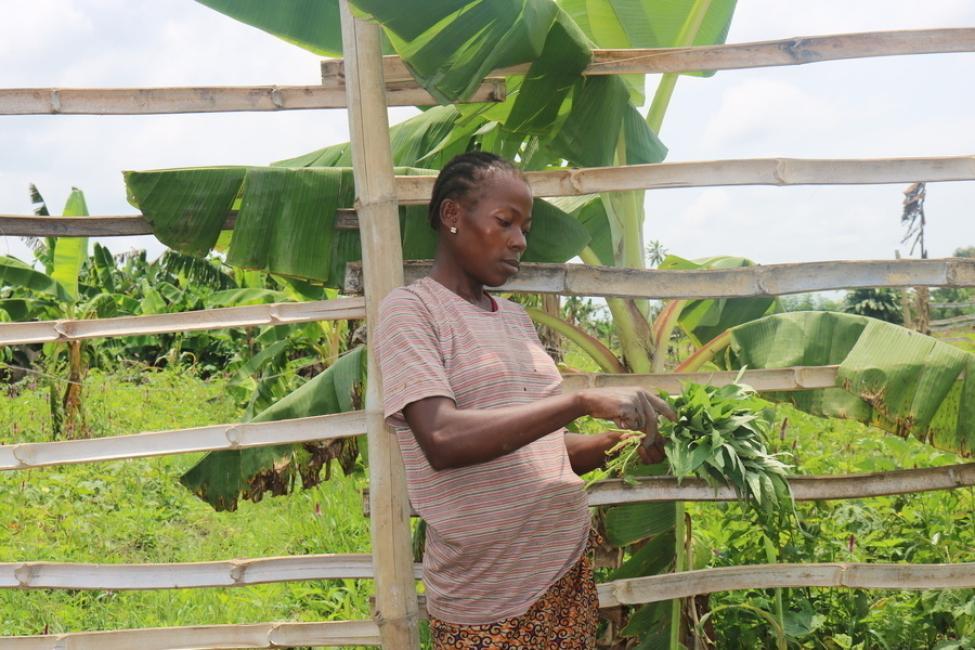-
Who We Are
WHO WE AREThe Environmental Migration Portal is a one-stop service website to promote new research, information exchange and dialogue, intended to fill the existing data, research and knowledge gaps on the migration, environment and climate change (MECC) nexus.
IOM Global
IOM Global
-
Our Work
Our WorkThe Environmental Portal aims to centralize relevant and up-to-date research, data, and information on migration, environment and climate change and
provide information on recent activities of IOM, including with its partners, in addressing the migration, environment and climate change (MECC) nexus.What we do
What we do
- Where We Work
- Data and Resources
- 2030 Agenda
Bingerville, 21 March 2023 – Kouadio Koffi Nadège is a 33-year-old farmer living in Bingerville, a small town about 15 kilometres from Abidjan. She is passionate about agriculture and spends most of her time growing vegetables.
"Four years ago, I left the centre of Côte d'Ivoire because I had no land to grow on. And I came to Abidjan, which was like an El Dorado for me. When I arrived, I was able to secure a small plot of land," she explains.
Every day, under a blazing sun, Nadège grows cabbages, eggplants, and lettuce on a plot of land that she rents temporarily from the village community to support herself.
Nadège's passion for farming allows her to grow her own food and provide for her family. She works hard to grow vegetables and earn a living. She chose peri-urban agriculture because it is an efficient way to grow vegetables on a small plot of land close to the city and thus stay close to her family.
However, water scarcity and limited access to water pumping infrastructure in many regions of Côte d'Ivoire seriously threaten the food security of thousands of people, including Nadège and her children. She explains that the lack of water prevents her from growing as many vegetables as she would like.
"Dependency on seasonal whims has had a negative impact on the yield of my activities. We produce one ton of vegetables, whereas we could produce ten tons if we had access to water," she says.
The water scarcity caused by climate change also has severe consequences for migrant workers in the agricultural sector. Labour migration and the difficulty of work are significant issues that undermine the security of these workers. Improving land and water management and providing easier access to irrigation infrastructure can help address these challenges.
"Water is a problematic resource for me; it is a real challenge to produce vegetables that allow me to feed my family and earn an income to send my children to school. Every day I have to travel many kilometres to collect wastewater to water my plants," says Nadège.
Migrant labour is heavily impacted by these issues, which undermine employment in the agricultural sector. Mitigating or solving the challenges caused by water scarcity requires better land and water management, as well as improved access to irrigation infrastructure.
In this sense, in order to increase the resilience of migrant and indigenous communities to water stress and climate change, and to strengthen the confidence of communities in local authorities and state structures, the International Organization for Migration (IOM) is implementing the project "Protection and Integration of Migrant Labour and Environment in Urban and Peri-urban Agriculture" (MITSA). The project will provide a solar pumping system to strengthen the resilience of urban and peri-urban agriculture actors to the consequences of climate change.
This project is essential for Nadège and many migrant workers, as it will improve their income and strengthen their resilience to climate change in a sustainable way. Nadège is optimistic about the future.
"Today, with this project, we will have sustainable access to water; we will be able to work less and have better yields. It will change my daily life!"
For more information, please contact :
Joëlle Furrer, Communications and Media Officer, jfurrer@iom.int, and Hind Assaoui Bennani, Regional Programme Specialist for Migration, Environment, and Climate Change, haissaoui@iom.int
